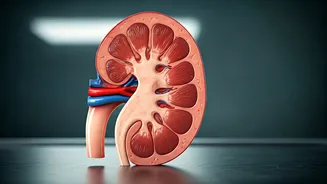The Kidney's Role
The kidneys are vital organs, essentially serving as the body's primary filtration system. They work constantly to remove waste products and excess fluids
from the blood, which are then excreted as urine. Beyond this filtering function, kidneys also maintain a healthy balance of electrolytes, control blood pressure, and help produce red blood cells. Given these diverse functions, it’s easy to see why kidney health is so crucial. Proper kidney function keeps the body in balance, and problems can lead to significant health complications. Dietary choices can drastically impact kidney health, making it critical to understand which foods can either help or harm these essential organs. Knowing what to avoid is a fundamental step in promoting lasting kidney wellness.
Processed Foods Beware
Processed foods often contain high levels of sodium, phosphorus, and other additives that can put strain on the kidneys. Sodium, found in many packaged snacks, canned foods, and fast foods, contributes to high blood pressure, a leading cause of kidney damage. Excessive phosphorus, used as a preservative, is difficult for damaged kidneys to filter, potentially leading to bone and heart problems. The convenience of these foods often comes at a cost to kidney health. Therefore, minimizing the intake of processed items and opting for fresh, whole foods is essential. Always check food labels carefully and be mindful of the hidden sodium and phosphorus content in seemingly healthy options. Simple substitutions like homemade meals can significantly improve kidney health.
Limit Red Meat
Consuming excessive amounts of red meat can lead to increased production of waste products that the kidneys must filter. The digestion of red meat creates a high load of nitrogenous waste, which can overwork the kidneys, particularly those already compromised. Furthermore, diets rich in red meat are often higher in saturated fats, which contribute to heart disease and indirectly affect kidney function. Moderation is key. Balancing red meat intake with plant-based proteins, such as beans, lentils, and tofu, can reduce the strain on the kidneys and provide a wider range of nutrients. Choosing lean cuts of meat and controlling portion sizes are also helpful strategies. Focusing on a balanced diet is crucial.
High-Potassium Foods
While potassium is a vital nutrient, excessive intake, especially through certain foods, can be problematic for individuals with kidney disease. The kidneys play a critical role in maintaining potassium balance in the body; when they are not functioning correctly, potassium can build up to dangerous levels, leading to heart rhythm abnormalities. Foods high in potassium, such as bananas, oranges, spinach, and potatoes, should be consumed in moderation or avoided, as advised by a healthcare professional. Careful meal planning, with a focus on low-potassium options and balanced nutrient intake, is an important part of a kidney-friendly diet. Consulting a doctor or a registered dietitian is recommended to determine appropriate potassium intake based on individual kidney health.
Dairy's Impact Explored
Dairy products, particularly those high in phosphorus, can present challenges for individuals with impaired kidney function. The kidneys struggle to excrete excess phosphorus, leading to a buildup in the blood. This can result in bone weakening and other health problems. While dairy provides essential nutrients like calcium and protein, the phosphorus content must be considered. In the context of kidney health, it may be necessary to limit intake. Alternative options, such as low-phosphorus dairy alternatives or calcium supplements, should be considered as a part of a tailored dietary approach. Working with a healthcare provider can help individuals manage their phosphorus intake and maintain proper nutrition while supporting kidney health. Adjusting dietary habits can make a real difference.













